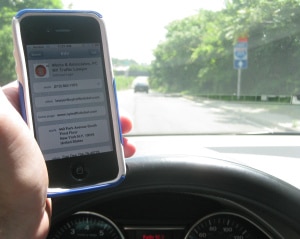
A NY Times article entitled “Cellphone Bans May Not Prevent Accidents” explores a recent study done by an economics graduate student from Texas A&M that concludes that such laws have little effect on accident rates. The study concedes that many drivers change their cellphone use when laws prohibiting using them while driving are enacted. However, it further states that this change in behavior does not necessarily translate into a reduction in accident rates. The study attempts to explain this ostensible anomaly by suggesting that some drivers who refuse to obey cell phone laws may be even more distracted because they use their phone while also trying to conceal its use. Alternatively, it suggests that some drivers illegally using cellphones may drive slower, thereby reducing the chance of an accident.
In my opinion, the study’s conclusion is flawed. Reducing the dangerous activity of distracted driving necessarily must reduce accidents. By definition, drivers who are not using a cell phone are safer than not, and (as the study admits) many people will follow the law. Perhaps, the study relied on faulty data regarding the extent of the problem. Or perhaps the study failed to analyze the precise causes of the included accidents. In any event, I am entirely skeptical of this study and, for the safety of us all, strongly believe that cell phone laws are necessary and beneficial.
